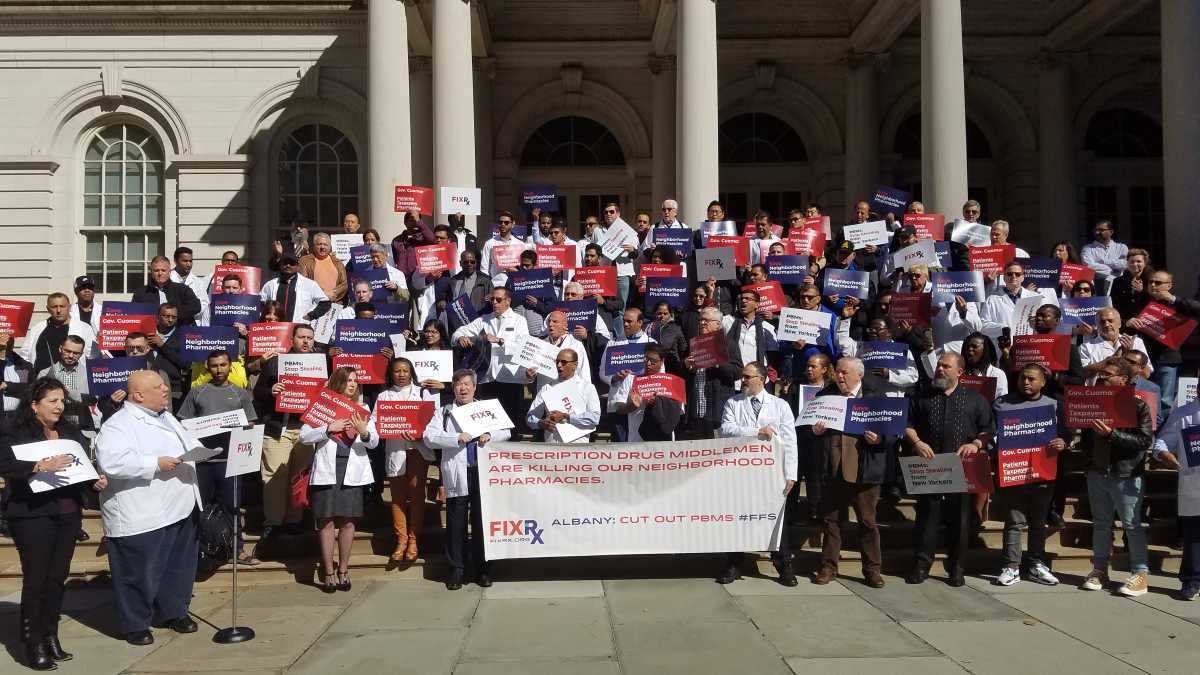Time’s running out for pharmacists across New York City and State seeking financial relief through legislation awaiting Governor Andrew Cuomo’s signature.
A state bill to regulate prescription drug middlemen, known as Pharmacy Benefit Managers (PBMs), was sent to Cuomo’s desk last week after the State Senate and Assembly passed it in June.
Independent pharmacists have been advocating for the legislation, and are now hoping that Cuomo will sign the bill, which they say would prevent PBMs from causing higher costs for pharmacies and patients. The legislation would require PBMs to be regulated and licensed.
“Up to this point, they have not been regulated,” said Vito Colombo, owner of Colombo’s Pharmacy in Queens. PBMs can substitute medication without the doctor’s approval, he said, and can determine where patients can get the medicine.
PBMs can charge insurers a higher rate for claims, then reimburse pharmacies at lower levels and keep the difference, in a method called “spread pricing.” The method cost New York State around $300 million last year in its Medicaid managed care program, according to Pharmacists Society of the State of New York.
Colombo said the problems from PBMs have gotten worse in recent years.
A survey of over 500 mom and pop pharmacy owners in New York found that 70 percent had to lay off employees and reduce hours because of PBMs shortchanging them.
Colombo, who opened the pharmacy 17 years ago next to a shop owned by his father, said he had to lay off an employee last year and never found the money to replace her.
“They’re shrinking the profit margins,” Colombo said of PBMs. “They need to be held accountable and be more transparent and be regulated, just like any other business in New York State.”
Adam Agovino, co-owner of Sedgwick Pharmacy in the Bronx, said PBMs affect the health care system from every angle. “It’s a broken system,” he said. “They basically control every facet of the pharmacy process.”
He said the PBMs have no health care expertise and “serve no purpose,” and yet they are a major player in the system. He agreed that the problem has worsened in recent years, and said it was due to a lack of regulation.
Agovino described being on the phone with doctors all the time, trying to navigate the health care process. A patient getting the same medication for the past 10 years might suddenly have trouble receiving it, he said.
When the State Senate was studying the effects of PBMs in June, the Pharmaceutical Care Management Association (PCMA), which represent the nation’s PBMs, disputed findings that they were negatively impacting the health care system. The group said it reduces prescription drug costs for New York employers and consumers, and advocates to keep drugs accessible and affordable.
“We believe that more can be done to address rising drug prices,” PCMA said in a June statement. “We stand ready to work with New York lawmakers to increase competition and build on market-based tools in public programs and private health insurance.”
The bill was sent to Governor Cuomo on Dec. 17 and he has until Dec. 28 to sign or veto it. In October, pharmacist John Kaliabakos at Village Apothecary in Greenwich Village, who has advocated for the bill, said Cuomo has been a great ally to independent pharmacies, and that he was expected to sign it.
Jason Conwall, a spokesman for Governor Cuomo, told this paper that the bill is under review, and said, “There were more than 900 bills that passed both houses at the end of session and over 100 bills remain under review by Counsel’s Office and the Division of the Budget. It is our responsibility to ensure that the bills, as written, are responsible, enforceable and accomplish their intended purpose.”
The pharmacists Colombo and Agovino are hoping the legislation will be signed and acknowledged it wouldn’t be a cure-all.
“It’s not a silver bullet,” said Agovino, “but it’s definitely a start.”






































